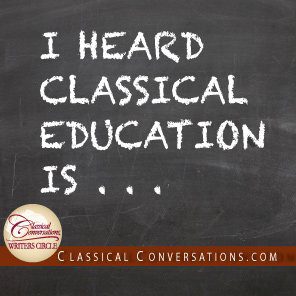Many modern educators and parents assume that classical education is as dry as dust. How could anyone possibly find it interesting to read stories about dead white guys, chant Latin noun and verb endings, or recite the multiplication tables? There is no creativity in that!
Furthermore, anyone who comes from this system of education would only be fit to work in the most monotonous industry. They would not be equipped to write, sculpt, or dance professionally.
Those who embrace this idea neglect to consider two things. First, they neglect to consider the nature of children. Second, they neglect to consider the evidence of history.
Since most of us are teaching young children at home, let’s talk about the nature of children first. After all, don’t we want our children to be creative? If so, how do we educate them to be creative thinkers? Is this even possible?
Modern educators have serious misconceptions about creativity. They seem to accept the notion that some children are born creative while others are not. Before too long, they assume that creativity is a mystical gift that descends from some nebulous region on high. Therefore, it cannot be taught. At the same time, modern education places a high premium on experiential learning, so they continue to implement creative assignments in the primary grades.
In order to “foster creativity,” modern educators often encourage very young children to write imaginative stories. However, this turns the natural order of things upside down. Very small children are seldom good at writing original stories for two simple reasons: 1) they have not heard a lot of stories yet, and 2) they have not had enough life experiences.
It is very difficult to write original stories if you have not been exposed to a lot of stories. In contrast, a good classical education immerses children in stories. This introduces children to ideas like setting, characters, and plot. If you turn a young writer loose without exposure to stories, they are likely to forget things like describing the setting or constructing a plot. After all, who could be expected to write a story until they know what a good story looks like?
A good classical education not only immerses children in stories, but in time-tested stories like fables, myths, and fairy tales. Through these classic tales, children are introduced to all the elements of a great story, but, more importantly, they are introduced to ideal types of people. Through these stories, they are introduced to heroes, heroines, and villains. They are connected to the stories and styles of the past.
In the past, artists, composers, authors, and dancers understood that they must learn from those who went before them. Composers mastered the styles and forms of those who went before them. Then, and only then, could they break forth with something new. Authors read and copied the style of great writers of previous generations and then wrote the great novel of their own time.
Picasso did not invent the cubist style because he could not paint realistically or because that style was his own special, mysterious talent. He was actually a gifted artist who drew detailed realistic sketches from a very early age. Like all other great artists, he began his career by copying the works of great masters. Only then, could he break the mold to develop his own unique style with its message about the chaos and confusion of modern life.
Classical education allowed Shakespeare to take stories from Greek and Roman mythology and from English history and to make of them wholly new masterpieces. Classical education also produced the creative genius of C.S. Lewis and J.R.R. Tolkien who were inspired by Old Testament stories and by ancient Greek and Norse mythology to create imaginary worlds used to teach important Christian truths. It also produced the creative genius of men like Thomas Jefferson who was equally at home writing laws and drafting architectural plans.
We have a unique opportunity before us to hand down the traditions of the past to our children. Then, we can stand back and delight in their response. One of my former Challenge students wrote, produced, and directed a Christian retelling of Robin Hood. Another wrote beautiful melodies and guitar accompaniment for the poems we read in Challenge III.
You see, a classical education sparks curiosity, fuels the imagination, and forges the way for the creation of something completely new. Here’s to raising a generation who can reclaim the arts for the glory of the Lord.




